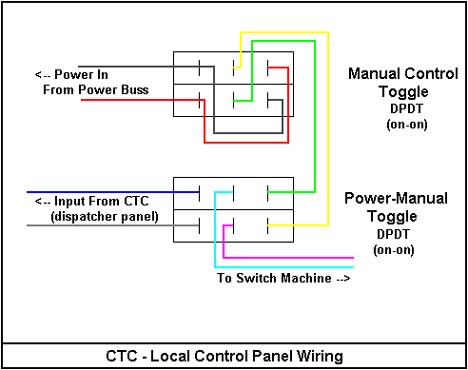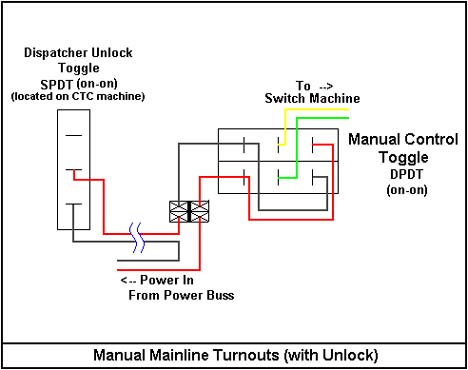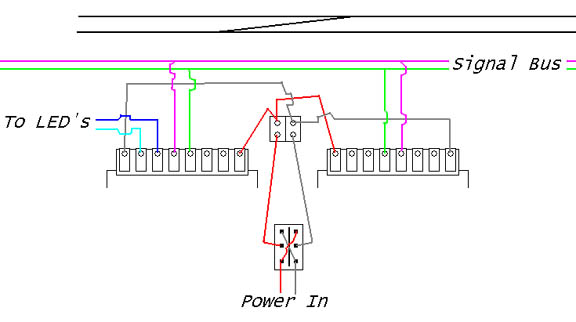Support this website by joining the Silver Rails TrainWeb Club for as little as $1 per month.
Click here for info.
This website has been archived from TrainWeb.org/cior to TrainWeb.US/cior.

The "Local Turnout Control" idea came from the "wanting to be as prototypical as possible" brain kick. In real life any powered turnout has 2 levers, the first being a "powered or manual" lever, the other is to actually throw the switch. So, if the dispatcher isn't able for whatever reason to throw the switch, he can give authority to throw the switch by hand. In order to do this, the crew member would take the "powered or manual" lever and throw it to "manual", then throw the turnout. So, wanting to be life like, I set out to make the most simple way to memic this.
After some thought, I decided the DPDT double switch would work best.
In order to make this work, I needed 2 DPDT (Double Pole-Double Throw) (ON-ON) switches. One would become the "powered or manual" lever, the other would become the turnout throw. In this setup the power is brought in via a common power bus, and all other wires are brought in to their respective locations.
So to start with the "powered or manual" switch.
The first thing is to get doorbell or 22 gauge wire in a pair, cut this roughly 24 inches long (this is a rough guess, as each location will call for its own length), attach one end to the DPDT's middle solder lugs, this line will run to the switch machine. Next run a length of the same wire to the outside lugs (either one) this line will come in from the dispatchers panel (I use a terminal strip to attach wires as an intermediate point). Once you have this, run a 16 inch length of wire, solder it to the other outside lugs on this switch, then solder the other end to the second DPDT switch, this wire will solder into the middle lugs. With this done its just a simple matter of crossing the wires in an X pattern from outside lugs on the second switch. Bring your power from the power bus into one side of the DPDT switch, once this is done, hook it up and see how it works, making adjustments to the position of the DPDT switch to be accurate.

This method has been used for a short time now, but it has worked flawless. In having the local turnout control I found that sometimes it wasn't easy to see the points of the turnout, this made me install LED's on the CP panel, thus with a quick glance operators can tell how they are lined if operating in (Non-TC mode). The LED's will be lit at all times and will display the turnout location even when its under "powered" dispatcher control.

(More info to come!)
This document is used for some education, use this method at your own risk, we will not be responsible for accidents or mistakes

Support this website by joining the Silver Rails TrainWeb Club for as little as $1 per month.
Click here for info.














